Lugu Lake - Ticketprijs, openingstijden, locatie en hoogtepunten

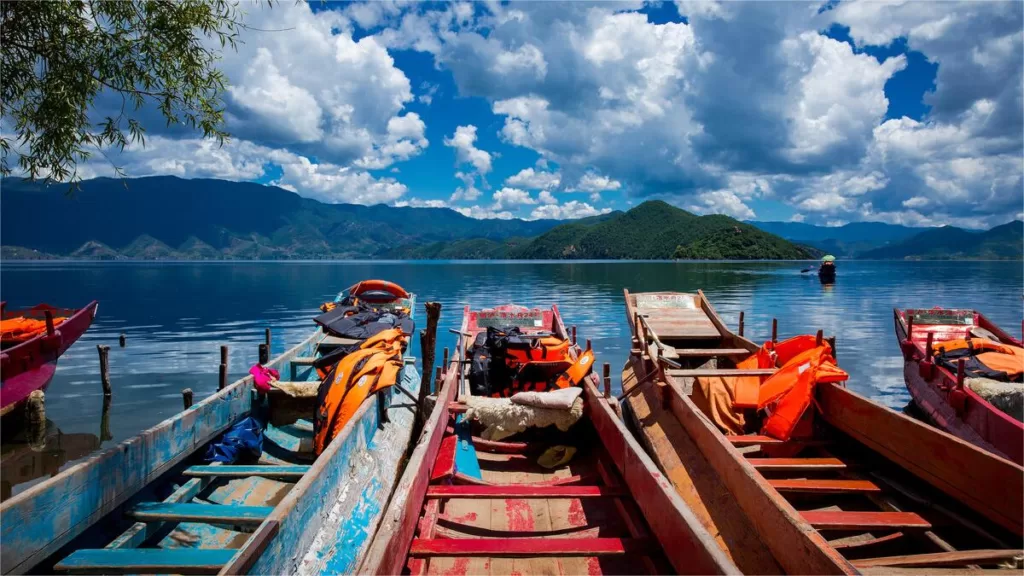
Lugu Lake (泸沽湖), situated on the border between Yunnan and Sichuan provinces in China, stands at an elevation of approximately 2685 meters. Renowned for its picturesque landscapes and the simplicity of its local culture, it is often referred to as the “Plateau Pearl.” The lake is surrounded by lush green mountains, with meandering shores hosting 17 beaches and 14 bays. Across the lake, there are five islands, three peninsulas, and a causeway-connected island. Notably, Black Wawu Island, Liwubi Island, and Lige Island form the trio known as the “Three Islands of Lugu,” offering captivating scenery and significant tourism value.
One of the unique cultural aspects of Lugu Lake is the presence of the Mosuo people on its Yunnan side. The Mosuo practice a system known as “walking marriage,” where men and women do not engage in traditional marriage but instead form more fluid partnerships. This distinctive tradition has led to Lugu Lake being dubbed the “Eastern Daughter’s Country.”
During the months of June to August, the lake becomes a spectacular sight as the water blooms with the floating petals of the Yang Flower. These delicate blossoms, resembling pure white ice or snow, create a mesmerizing scene. With the wind gently brushing over the lake, the flowers appear to be suspended in the air, evoking a sense of enchantment and transforming the area into a heavenly realm on earth.
Numerous villages dot the lakeside, with Dalaoshui Village and Lige Village being relatively more developed, offering amenities such as dining and accommodation. Dalaoshui Village, situated on the southwestern shore, has been a long-established settlement with regular bus services connecting it to Lijiang. Meanwhile, Lige Island and Lige Village on the northwestern shore have become popular tourist destinations in recent years.
Other villages along the lake include Nise Village, Xiaoluoshui, and Dazui Village on the northern shore, known for their tranquility due to fewer visitors. Moving eastwards, as one enters Sichuan province, the southeastern shore unveils attractions such as Caohai and the former residence of a princess, providing additional points of interest for those exploring the diverse beauty of Lugu Lake and its surroundings.
Inhoudsopgave
- Basisinformatie
- Locatie en vervoer
- Highlights of Lugu Lake
- Vlog about Lugu Lake
- Nuttige tips uit recensies
Basisinformatie
| Website | http://www.sclgh.cn/ |
| Geschatte lengte van de tour | 1 -2 days |
| Ticket Prijs | 70 RMB |
| Openingstijden | 8.00 - 18.00 |
| Gebied | 50.1 square kilometers |
| Lengte van de kustlijn | 44 kilometers |
| Diepte | Average: 40.3 meters Deepest spot: 105.3 meters |
| Geology | The third-largest freshwater lake in China |
| Telefoonnummer | 0086-0834-6390302 |
Locatie en vervoer
Lugu Lake is a captivating alpine lake located in the northwest of Yunnan Province and the southern part of Sichuan Province in southwestern China. Situated at an elevation of approximately 2,685 meters (8,809 feet) above sea level, the lake straddles the border between these two provinces, creating a picturesque and unique setting.
To get there, tourists from Kunming or Chengdu can fly to Ninglang Luguhu Airport (宁蒗泸沽湖机场) and then transfer to a coach to cover the remaining 25 kilometers. Alternatively, you can also take a train or plane to Lijiang (丽江), stay in this picturesque ancient town for a couple of days, and then take a coach to Lugu Lake, which is about 180 kilometers away.
Highlights of Lugu Lake
Gemu Goddess Mountain
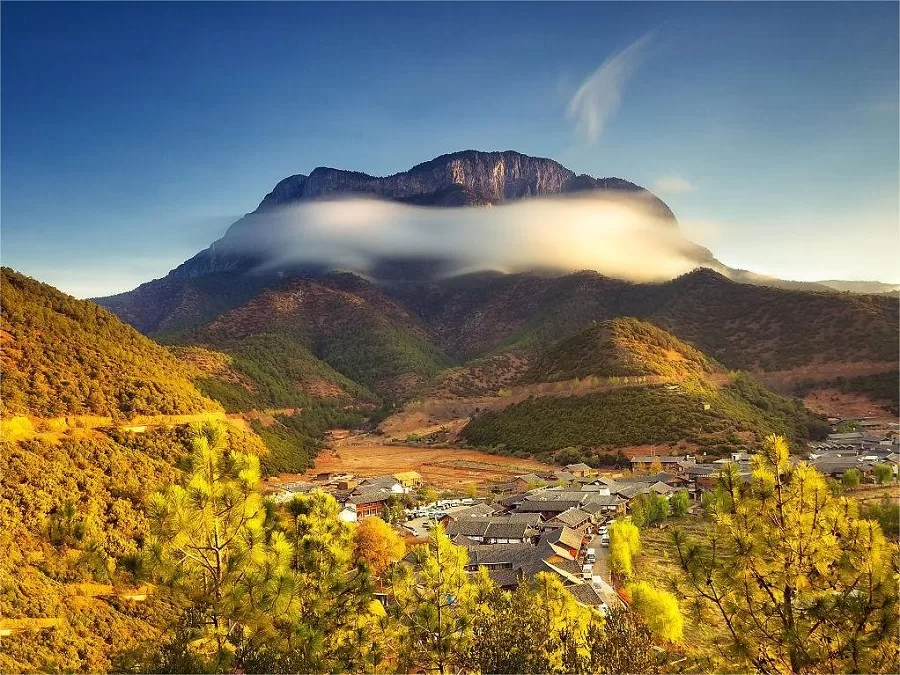
Gemu Goddess Mountain majestically rises near Lugu Lake (standing at 3770 meters), exuding an ethereal aura in southwestern China. Revered as a sacred site, it intertwines nature and spirituality, captivating all who venture near. Its lush slopes embrace legends of the ancient Gemu Goddess, infusing the landscape with mystical allure. Cloud-kissed peaks and serene waters form a harmonious canvas, drawing pilgrims and explorers alike. The mountain stands as a living testament to the cultural tapestry woven around Lugu Lake, inviting visitors to partake in its tranquil beauty and delve into the profound stories etched within its rocky embrace.
Landschappelijke schoonheid
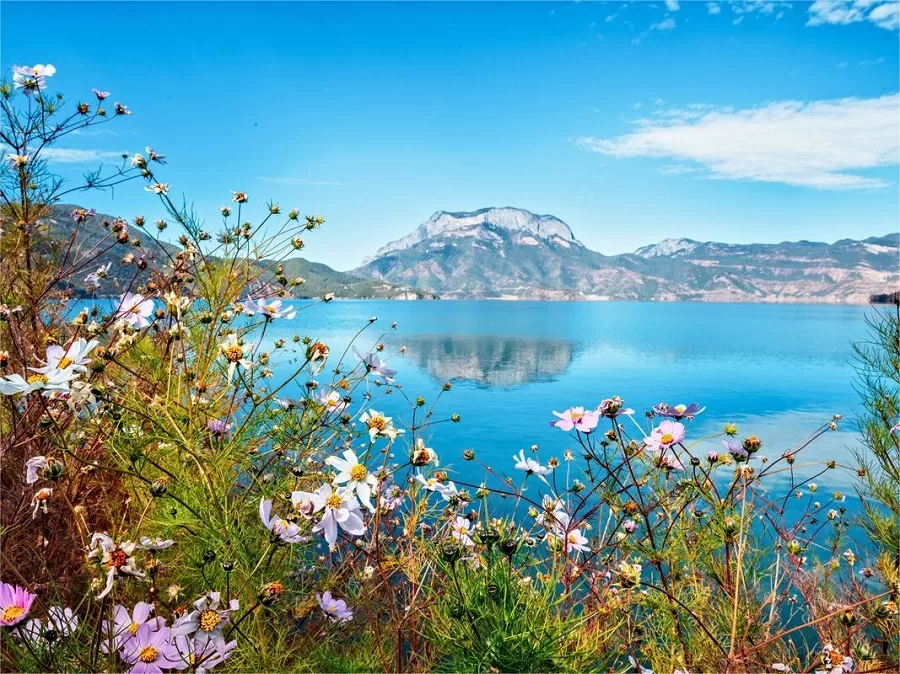
Lugu Lake’s scenery is a mesmerizing symphony of nature’s beauty. Nestled amidst lofty mountains, the lake’s crystal-clear waters mirror the lush landscape, creating a serene sanctuary. The undulating hills and pristine forests embrace the shoreline, adorned with traditional stilt houses that reflect local heritage. The tranquil ambiance invites reflection, while boat rides offer intimate encounters with this enchanting ecosystem. Across the waters, Gemu Goddess Mountain stands as a majestic guardian. Lige Peninsula extends its graceful curves into the lake, perfect for contemplative strolls.
Matrilineal Mosuo Culture
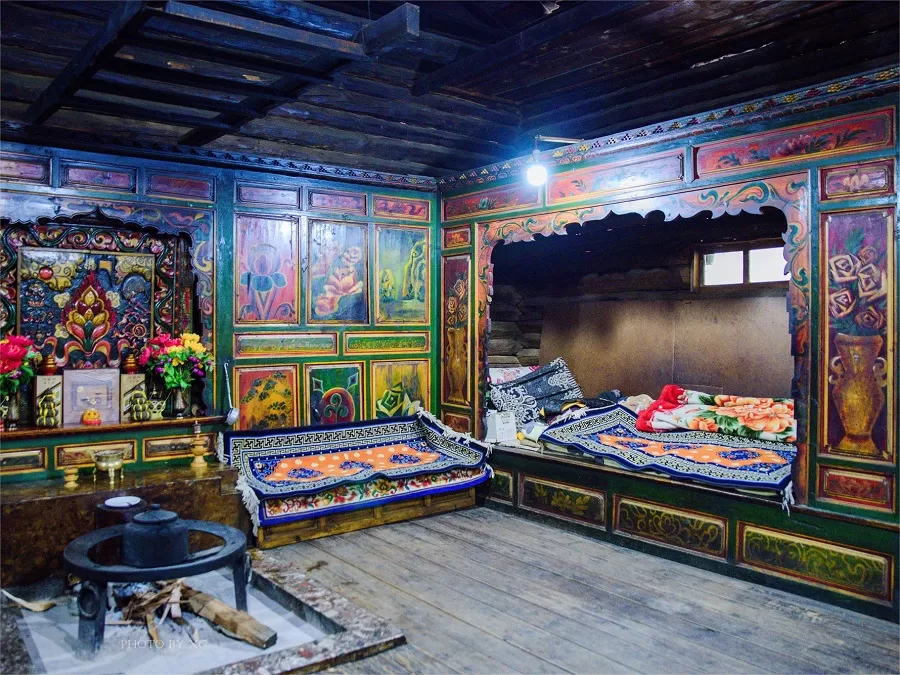
The Matrilineal Mosuo Culture of Lugu Lake is a captivating tapestry of traditions. Residing in this highland realm, the Mosuo people trace their lineage through maternal heritage, shaping a unique matriarchal society. Women hold central roles in family and community, fostering harmony. “Walking marriages” offer a distinct approach to relationships, where partners reside separately, reinforcing communal bonds. Their rituals, like the “Singing and Dancing Courtyard,” celebrate life’s milestones (Mosuo Folk Museum). This culture embraces a profound connection with nature and reveres the lake as sacred.
Traditional Stilt Houses
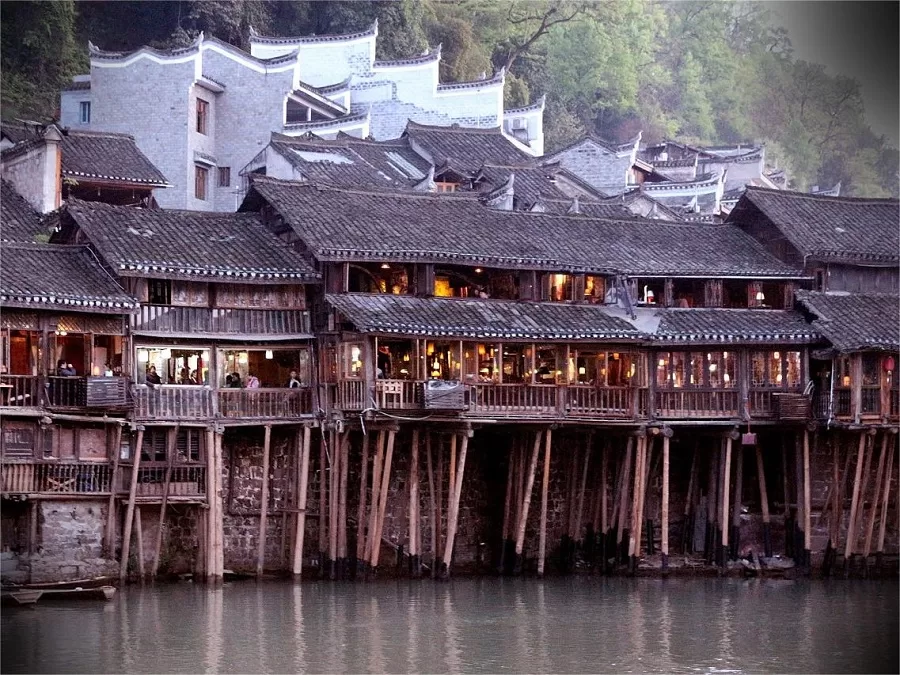
Graceful and evocative, the stilt houses of Lugu Lake stand as timeless symbols of cultural heritage. Perched elegantly above the water, these traditional wooden dwellings are a striking embodiment of the Mosuo way of life. Intricately designed and ingeniously constructed, they blend harmoniously with the tranquil lake surroundings, reflecting the region’s deep connection to nature. These elevated abodes, with their charming architecture, serve as both functional homes and cultural expressions. The stilt houses of Lugu Lake encapsulate a living testament to the ingenuity and enduring traditions of the local Mosuo people, adding a unique dimension to the captivating scenery.
Glistening Islands
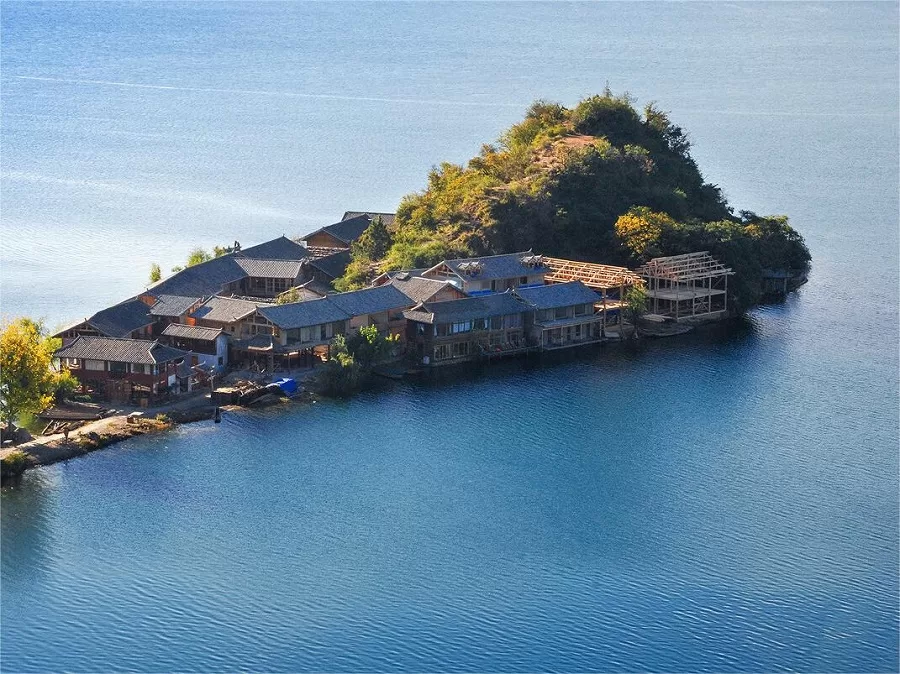
Lugu Lake’s islands are nature’s jewels, dotting the serene waters with a mystical allure. Among them, Lige Island and Liwubi Island stand as enchanting oases of beauty and tranquility. Lige Island is a cultural gem, hosting traditional Mosuo ceremonies and offering insights into their way of life. Liwubi Island, on the other hand, is a haven of untouched wilderness, inviting exploration and introspection. Both islands are embraced by the lake’s breathtaking panorama, inviting visitors to experience the interplay of culture and nature. Apart from them, Luoke Island served as the residence of Dr. Locke, an American botanist, for years.
Colorful Festival
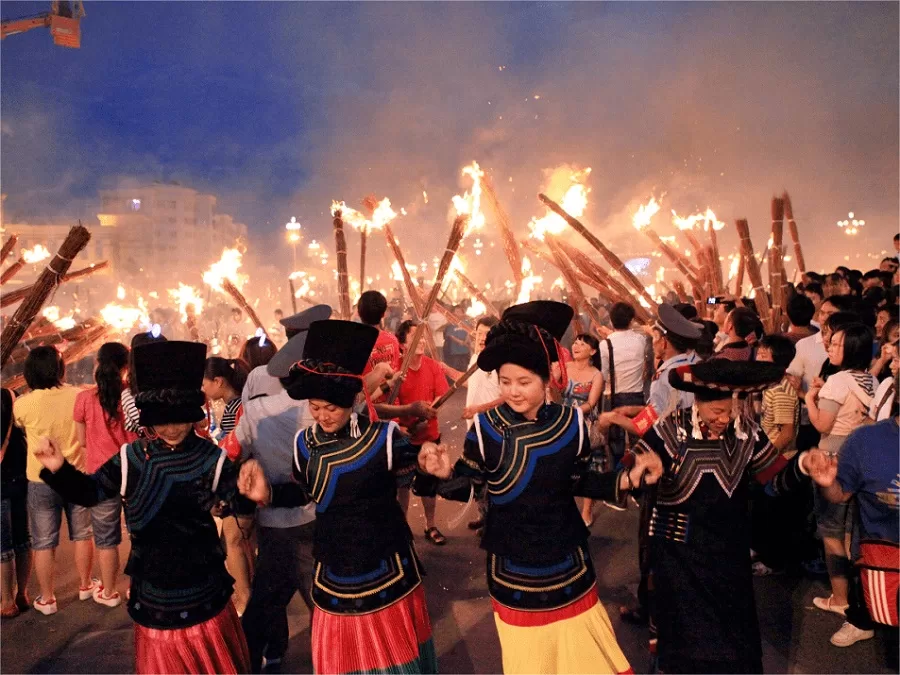
Lugu Lake comes alive with vibrant and enchanting festivals, painting the landscape with a kaleidoscope of traditions. The Torch Festival in Luoshui Village ignites the night sky with flaming torches, uniting communities in celebration. The Raosanling Festival, a Mosuo gathering, reverberates with singing, dancing, and heartfelt rituals, fostering cultural unity. During the Water Splashing Festival, joy cascades as water becomes a symbol of renewal and blessings. These colorful festivities are a captivating blend of ancient customs and contemporary merriment, offering a glimpse into the rich tapestry of local life and a chance for visitors to immerse themselves in the radiant spirit of Lugu Lake’s cultural heritage.
Diverse Flora and Fauna
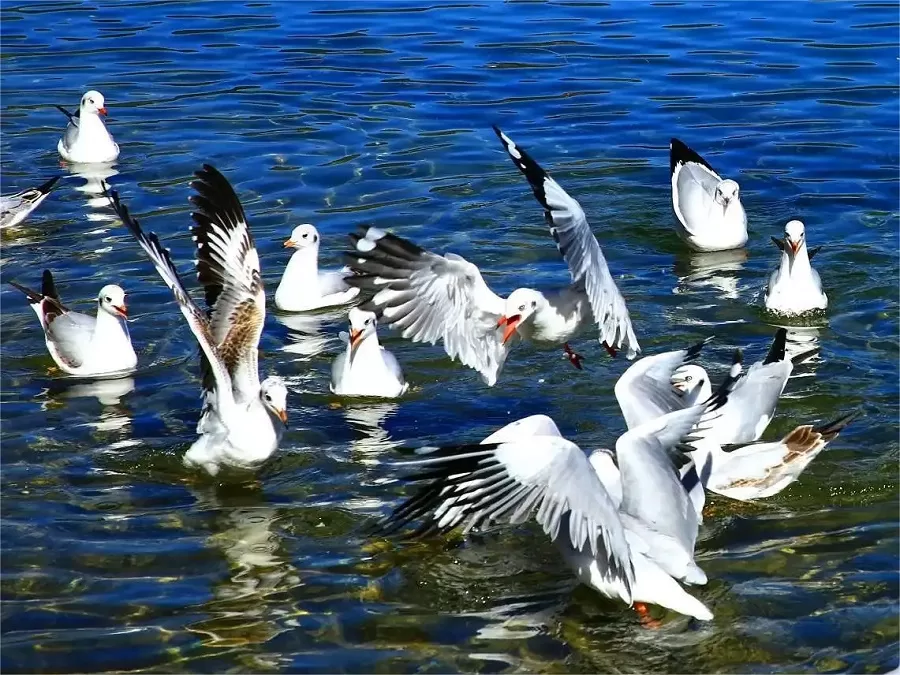
Lugu Lake’s ecosystem thrives with diverse flora and fauna, composing a symphony of nature’s wonders. Towering firs, vibrant rhododendrons, and meadows of wildflowers paint the landscape in a myriad of colors. This botanical richness provides a haven for various species, from agile Yunnan golden monkeys swinging through treetops to elusive leopard cats prowling the shadows. The lake itself teems with life, hosting fish like perch and carp, while its shores echo with the calls of migratory birds like black-necked cranes. Lugu Lake’s intricate web of life is a sanctuary where nature’s harmony thrives, inviting admiration and awe from all who visit.
Vlog about Lugu Lake
Nuttige tips uit recensies
- Transportation from Lijiang:
- Consider carpooling to Lugu Lake from Lijiang, as the journey takes about 4 hours and costs around 80 yuan. Many hotels offer shuttle services to and from Lugu Lake.
- Best Sunset and Sunrise Locations:
- For the best sunset, head to Goddess Bay. It’s recommended to arrive early to secure a good viewing spot.
- For sunrise, the ideal locations are on the Lige Peninsula. There are two viewing points: by the lakeside and at the Lige Observation Deck. Lige Village by the lakeside has steps leading up to a platform with great views. This area is also suitable for stargazing.
- Bicycle Caution:
- Avoid biking around the entire Lugu Lake as it is large with winding mountain roads, and it can be dangerous. Instead, consider other transportation options for safety.
- Overwegingen met betrekking tot het weer:
- Check the weather conditions before your visit. Rainy days can make the lake water less clear, affecting photo quality.
- Different seasons offer unique beauty. Avoid the rainy season (June to August) for better weather and clearer views. Also, consider avoiding the crowded periods around National Day and Chinese New Year to avoid higher accommodation costs.
- Best Boat Tour Location:
- The best boat tour experience is at Cao Hai (Grass Sea). Here, you can witness different landscapes from Yunnan and Sichuan provinces.
- Mosuo Bonfire Evening Party:
- There’s a Mosuo bonfire evening party in Daluoshui Village, with a ticket price of 30 yuan. It’s a bit commercialized, and the experience might not be very authentic. If you prefer a quieter experience, you can choose to skip it.
- Seasonal Attractions:
- Lugu Lake showcases different beauties in various seasons. From June to September, you can witness the blooming of “Water Yang Hua” flowers. From November to March of the next year, you can enjoy feeding seagulls at the dock and watching the morning mist. Avoid the rainy season for better views.
Attracties in Lijiang, Other parts of Sichuan, Sichuan landschap